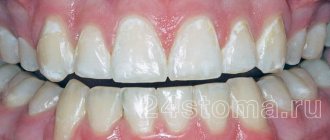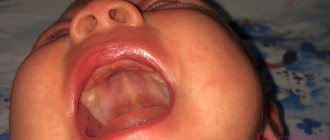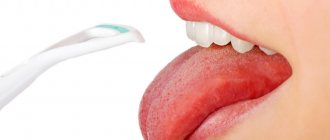July 3, 2020
If you notice a white spot on your or your child’s gum, this may be a sign of various diseases that require treatment by a dentist. Sometimes white spots on the gums do not pose a serious danger, but they still require careful monitoring, as well as the use of measures that will help prevent their systematic occurrence. We suggest reading the article from the UltraSmile.ru portal to find out the most common reasons why, according to experienced doctors, this symptom appears.
First reason: traumatic damage to the mucosa
If a white spot appears on the gum, then the first thing you might think of is a mucosal injury. It seems that the reason is not so dangerous, but there is no need to think so, because often the cause is not only the consumption of sour, hard, too hot or spicy food, but also other circumstances:
- malocclusion,
- wearing poorly made, incorrectly installed bridges, crowns, removable dentures,
- decayed teeth,
- aggressive oral hygiene, abuse of highly abrasive pastes, use of brushes with hard bristles,
- smoking.
The cause of the pathology may be injury to the mucous membrane.
All of the above causes cause systematic injury to the mucous membrane of the oral cavity. If they are not eliminated, white spots on the gums can become a serious problem, develop into malignant formations or provoke the appearance of various diseases.
Diagnostics
Only a doctor can determine the causes of white spots on the gums. The patient needs to talk about his feelings and events that preceded the appearance of this formation. Doctors usually visually identify the disease. But to clarify the diagnosis, you may need:
- blood analysis;
- X-ray.
The appearance of white spots on the oral mucosa may not necessarily indicate a dental disease. The patient should visit an otolaryngologist to exclude or confirm an ENT disease.
Second reason: stomatitis
A white spot on the gum that hurts may indicate a disease such as stomatitis. Stomatitis very easily appears against the background of systematic trauma to the mucous membrane and infection inside the wound. The pathology is especially common in infants and young children.
There are many different forms of stomatitis: traumatic, viral, candidal, vesicular, bacterial, allergic, prosthetic. There are also different forms and stages of the disease: catarrhal, aphthous, ulcerative gangrenous. Moreover, each of them has its own distinctive features, signs and symptoms. For this reason, pathology should never be treated independently, because different drugs are prescribed for each type and form.
The photo shows stomatitis
A white spot on the gums of an adult, indicating stomatitis, often occurs due to trauma to the mucous membrane from chipped unrestored teeth, poorly made dentures or poorly installed orthodontic structures. Stomatitis of an infectious nature is more common in children.
Symptoms of root caries
Pathology has the same symptoms as caries of other classifications, but its impact is more destructive, and the consequences are more unpleasant and more dangerous for dental health. Carious lesions can spread deep inside, gradually destroying all the canals. Here is what the main signs of cervical caries look like:
- increased reaction of teeth to cold, hot, sour, sweet foods;
- the appearance of dark spots on gums with carious lesions;
- pain when chewing food and while brushing teeth.
All of these symptoms indicate the development of a disease that consists of several stages.
- Chalk stain. At this stage, a slight dark spot appears on the surface of the enamel without changing its shape or size. Particular sensitivity to acidic foods may occur. At the matte spot stage, caries under the gum is eliminated without the use of a drill.
- Superficial stage. The spot becomes rough, and gradual destruction of the enamel begins. A diseased tooth reacts to various irritants, in addition to sour: hot, cold, including cold air, mechanical stress. The pathology begins to actively progress.
- Middle stage. Cavities form in teeth as dentin is destroyed. The defect is already becoming clearly visually noticeable.
- Deep stage. The process spreads deep into the tooth, reaching the roots and nerve endings. The pain can be very severe, especially at night, and discomfort occurs when inhaling cold air.
There is no clearly defined boundary between the listed stages; the transition from one to another is so smooth that it is almost impossible to track it. In an advanced stage, serious consequences can develop: for example, circular caries, when the process already covers the entire gingival area of the crown in a circle. Teeth at this stage break off easily.
Third reason: cyst
Is there a white spot on the gum above the tooth that hurts? It is likely that you have a cyst. This pathology occurs due to untreated or poorly treated dental diseases: caries and pulpitis, periodontitis. For a long time, the cyst may remain unnoticed and not cause discomfort, but as it grows it makes itself felt.
A cyst may be the cause of a white spot
If it comes to the point that you see a white formation on the gum, then this means that the cyst has grown to a significant size, and you have not undergone preventive examinations at the dentist for a long time, otherwise the problem would have been diagnosed long ago.
Treatment of cervical caries
It is very important to contact your dentist for help while the process has not yet become global. A competent specialist knows how to effectively treat this disease in order to save teeth and eliminate the consequences. At the initial stage, you can still do without the use of a drill and filling, which allows you to significantly save your budget. The doctor determines treatment methods depending on the degree of pathology and the general clinical picture. Each stage requires its own approach to therapy.
Treatment at the spot stage
In this case, remineralizing therapy and additional means of protection are used. The doctor removes tartar and plaque from the teeth, then applies fluoride strips to the affected areas. This element helps regenerate enamel layers and stop the carious process. At home, you can use herbal decoctions, solutions of fluoridated salt and water to rinse the mouth, use pastes and threads containing fluoride.
How to treat cervical caries of the superficial and middle stages
At these stages, the doctor removes the damaged tooth tissue and polishes the carious area. The procedure is completed with remineralizing therapy. If necessary, a filling is placed.
Method for treating deep caries
At this stage of the disease, coping with it is not an easy task. The treatment consists of several sessions. Here are the procedures the dentist performs:
- Anesthetic injection. When treating cervical caries, the doctor must provide anesthesia, since the area near the gums is very sensitive to action.
- Cleaning enamel from plaque and tartar. This is necessary to prevent infection from reaching the affected area.
- Selecting the color of the filling material.
- Removing carious tissue using a drill.
- Treatment of the cavity with an antiseptic and adhesive material.
- Filling. The composite material is applied in layers, each of them is treated with a photopolymerization lamp for hardening.
- Grinding and polishing the tooth surface. The dentist gives the surface the correct shape and makes sure that he has achieved the correct bite.
Thus, each carious tooth is treated. The process can take a long time and cost a lot of money - another argument in favor of regular prevention.
Fourth reason: fistula
A fistula is a consequence of untreated or poorly treated dental diseases. The inflammatory process begins in the soft tissues next to the diseased tooth; as it grows, first serous and then purulent fluid accumulates, which begins to put pressure on the tissue and look for a way out - this is how a specific channel for the release of pus is formed - a fistula.
A fistula on the gum is a white spot with a hole in it, and the new growth hurts. But if the pus begins to come out, then the discomfort and pain temporarily disappear, and the spot itself decreases in size. However, this does not mean that the disease has receded, it has simply entered a chronic stage.
An ulcer may symbolize the presence of a fistula
Features of the disease
This type of caries is especially dangerous and unpleasant, as it has some peculiarities in its course and location. Its manifestations are associated with the following factors:
- Carious lesions are localized in the weakest area near the neck of the tooth (this is the part covered by the gum). In this zone, the enamel is also weakly mineralized, and this factor enhances the development of caries.
- Circular distribution. Cervical caries affects the tooth in a circle, covering increasingly larger areas. As a result, part of it may break off, since the integrity will be broken in many places.
- Damage to the front teeth. An unpleasant feature of gingival caries is its frequent location on the incisors. A person experiences psychological discomfort when he has to talk, smile, laugh.
Under the influence of the bacteria Streptococcus Mutans, which causes the development of the disease, the enamel and dentin underneath are actively destroyed. Inflammation can spread to the pulp and ultimately lead to pulpitis or periodontitis.
Fifth reason: leukoplakia
White scaly spots on the gums of an adult or child can be a harbinger of a very dangerous precancerous condition - leukoplakia. New growths of whitish color can also cover the palate and tongue. The bad thing is that the pathology is almost asymptomatic, the patient does not experience pain or serious discomfort. If the white spot becomes cloudy and turns grayish, this indicates that the neoplasm has transformed into a malignant form.
White spots may indicate leukoplakia
Consequences of cervical caries if left untreated
Advanced caries near the gums is very dangerous, it can progress quite quickly and cause complications such as:
- periodontitis;
- pulpitis;
- inflammation of the gums;
- an abscess or a well-known flux.
In addition, the development of caries in the gums is often associated with pathologies of the thyroid gland and diabetes mellitus. It is necessary to conduct a comprehensive diagnosis to determine the exact cause of the disease. After the therapy prescribed by the endocrinologist, the disease may recede.
Sixth reason: wen, or lipoma
Yes, yes, there are wen in the mouth too. In this case, the white spot on the gum should not hurt. The problem may appear due to hormonal imbalance or injury. The wen increases in size very slowly and does not pose a serious danger. Doctors say that the likelihood of its degeneration into a malignant tumor is very low, but if the pathology recurs (for example, if it appears again after laser removal), it is better to perform a biopsy to rule it out.
The photo shows a wen
Wen represent only an aesthetic problem, but, growing to large sizes, they can cause discomfort and be constantly injured. Large tumors are recommended to be removed by surgery.
The wound is bleeding
In dental practice, there is only one known case in which a patient died after the removal of three adjacent teeth. The cause of death was not blood loss at all. The patient could not think of anything better after the operation than to drink a fair amount of alcohol and go to bed. Alcoholic drinks affect the liver, which increases bleeding. Due to alcohol intoxication, the sleep was sound, blood entered the respiratory tract, and the poor man choked.
In any case of bleeding due to an extracted tooth, the patient should calm down.
You only need to seek medical help in one case, if blood flows out of the wound in a stream.
If the patient is worried about bleeding, it is enough to make a tampon from sterile material and press it with your teeth to the wound for half an hour. If necessary, the doctor will prescribe special medications to stop bleeding. Doctors do not recommend using hydrogen peroxide in such cases.
If bleeding continues for more than a day, this is a symptom of a complication. Only a dentist, upon examination, will determine the cause of these complications and prescribe further treatment.
Seventh reason: suppuration after tooth extraction
Alveolitis can be mistaken for a white spot on the gum of an adult, which formed after tooth extraction and hurts. In this case, the socket of the extracted tooth becomes inflamed and becomes covered with a whitish (grayish) coating. All this may be accompanied by an increase in body temperature, discharge of pus from the wound, swelling of the soft tissues, and bad breath.
Alveolitis occurs after tooth extraction
If you have alveolitis, you need to see a doctor as quickly as possible, and for this there are 3 compelling arguments, which you can read about in the feature article on our website.
There's something white in the hole
During tooth extraction, little depends on the patient. The doctor amputates the tooth and places a tampon in the wound; the patient has to hold it for at least 15 minutes. If the bleeding stops after this, the person is released. The dentist warns that pain for four hours after this is normal. From the hole left by the tooth, white ichor with streaks of blood comes out. This process is especially intense when a wisdom tooth is removed; discharge is sometimes observed within 24 hours.
It is normal if a bloody clot remains in the socket. It does not need to be removed; the clot performs important functions:
- prevents bleeding;
- protects the body from the penetration of pathogenic bacteria that live in the oral cavity;
- forms the basis for new tissue to replace the tooth.
Bleeding may last longer if the operation is not performed carefully or the patient takes certain medications or suffers from liver disease.
If the bleeding stops, and after a couple of hours it appears again, this is a variant of the norm, indicating the cessation of the effect of the vasoconstrictor drug.
A white spot on a baby’s gum is a separate topic for conversation
White spots on the gums of young children are of particular concern to parents. Although there are not always reasons to panic. We will list the most harmless reasons why they appear:
- teething: occurs at the age of 4–5 months and older and may be accompanied by others: increased salivation, coughing and nasal discharge, the baby’s desire to put everything in his mouth, restlessness. During this period, you need to carefully monitor the child's condition. If you doubt or suspect that it is not the process of teething that is to blame, but other pathologies and diseases, then contact your pediatrician or dentist,
A baby's teething may be mistaken for a white spot - Bon's nodules: characteristic of newborns. They are smooth, whitish, do not exceed 1–3 mm in diameter1, and are localized mainly in the palate. Dissolve on their own within the first three months of the baby's life.
- Epstein pearls: These can be confused with Bohn's knots. They consist of epithelial tissue, externally resemble small grains or beads, and dissolve on their own. Occurs in 65–85% of all newborns.
“Once I noticed that my little son, who was only one month old at the time, had some white stripes on his gums and lower jaw. When the pediatrician examined him, she said that it was not a strip at all, but a neonatal tooth, an incisor, which began to erupt so early. I was shocked that this happened. The doctor said that although this is a very rare case, it is not critical. Now we need to observe, because... this tooth may end up quietly standing in the row of milk teeth, or it may be supernumerary, in which case it will have to be removed later.”
Maria K, review from woman.ru
In the cases listed above, parents do not need to sound the alarm. However, there are situations in which a white dot on a baby’s gum, especially if it hurts, may indicate candidiasis and stomatitis. Then you need to contact a specialist. White dots can also appear in children due to allergies to food, the introduction of new complementary foods and a change in formula.
If the white dots do not go away for a long time, or appear systematically, then this is a reason to consult a doctor and get examined. The symptom may indicate a violation of calcium metabolism in the body, dysfunction of the endocrine system or vitamin deficiency.
Notice
: Undefined variable: post_id in
/home/c/ch75405/public_html/wp-content/themes/UltraSmile/single-item.php
on line
45 Notice
: Undefined variable: full in
/home/c/ch75405/public_html/wp-content /themes/UltraSmile/single-item.php
on line
46
Rate this article:
( 3 ratings, average: 5.00 out of 5)
gum disease
- Shakovets N.V. Dental examination of young children // Modern dentistry. – 2022.
Expert “If a white dot appears on the gum and it hurts, then this may indicate the presence of an abscess or any other purulent inflammation. Do not self-medicate under any circumstances, do not resort to traditional methods and do not try to squeeze out the tumor - all this can be harmful to health, and the infection will go deep into the body.” Dentist-therapist Elena Vladimirovna Orlova
Consulting specialist
Orlova Elena Vladimirovna
Doctor rating: 9.5 out of 10 (2) Specialization: Dentist-therapist Experience: 33 years
Poor nutrition
Another reason for the appearance of white spots on the gums is considered to be a violation of the diet. Vitamin C deficiency can manifest itself in different ways, negatively affecting different organs, including the gums. Microcracks may appear on them, into which bacteria penetrate and lead to inflammation.
Nutrition should strengthen the immune system in order to accelerate regeneration in the body. The menu should consist of:
- cheese;
- cottage cheese;
- garlic;
- young beef;
- spinach;
- fish;
- fermented milk products.
Comments
I’m taking a teeth whitening course at home, a kit was given to me by a friend. I began to notice that after the third procedure a white dot appeared on the gum and it hurt. What could it be?
Vika (07/18/2020 at 10:48 pm) Reply to comment
- Dear Vika, there may be several reasons for your problem in this case: an allergic reaction to the components of the whitening composition, traumatic injury and burns as a result of chemical contact with the gums. Before applying whitening preparations, the mucous membrane must be well isolated, safety precautions must be observed, which is quite difficult to do at home, which is why we recommend carrying out whitening procedures in a dental office.
Editorial staff of the portal UltraSmile.ru (07/21/2020 at 09:14) Reply to comment
Hello! Two years ago I had a cyst removed on my gum. About a month ago I noticed that a new cyst had appeared in the same place. It doesn't hurt, but I'm worried about its reappearance. What is this connected with?
Olga (08/21/2020 at 10:16 am) Reply to comment
Hello, 2 spots appeared on the upper gums, I was diagnosed with stomatitis. Antibiotics were prescribed. I took the whole course, but nothing changed. Maybe the diagnosis is wrong?
Oksana (08/21/2020 at 12:04 pm) Reply to comment
A month ago I had a crown installed on my left upper six. The gums around me still hurt, although the doctor said it was normal. Recently I noticed white painful spots above the crown. After rinsing, the pain subsides, but the formations themselves do not go away. Should I go to a specialist or continue rinsing at home?
Nelya (08/21/2020 at 17:50) Reply to comment
Tell me why white spots may periodically form in the gum area of a seven-year-old child, what could be the reason for this, and what treatment is recommended for the child in this case?
Yuliana (08/21/2020 at 09:13 pm) Reply to comment
From time to time, something similar to stomatitis appears on the gums. The gums become inflamed and painful. It bleeds a little. At the site of gum swelling, you can see a white spot. But after 3-4 days everything goes away. What could this be symptoms of?
Olya (08/21/2020 at 11:42 pm) Reply to comment
And if this white spot on the gum constantly appears and then goes away, is it possible to get rid of it for good? What treatment is required and what toothpaste is best to choose in this case?
Raya (08/22/2020 at 02:32) Reply to comment
Please tell me, my child is 2 years old and has some white spots on his gums, not as small as ours in the photo. They don't bother the child. During the examination, the doctor said that there was no need to worry. Is it so?
Alexandra (09/23/2020 at 12:50 pm) Reply to comment
My husband periodically develops a white and very painful spot in the gum area. The reasons for the appearance of this spot are unknown, but during the period when it appears, he cannot fully eat due to pain. How to treat a white spot that periodically forms on the gum?
Sabina (09.23.2020 at 14:56) Reply to comment
A light-colored spot has formed on the teenager’s lower gum; the child complains of pain and discomfort in the mouth. What remedy can you recommend to help the oral mucosa recover faster?
Sonya (09.23.2020 at 15:44) Reply to comment
Initially, unpleasant sensations were observed in the upper gum area, later redness appeared, and even later a white visible spot appeared. What could it be, and how can I cure this spot, since it also hurts.
Violeta (09.23.2020 at 15:49) Reply to comment
Initially, unpleasant sensations were observed in the upper gum area, later redness appeared, and even later a white visible spot appeared. What could it be, and how can I cure this spot, since it also hurts.
Velisa (09.23.2020 at 15:50) Reply to comment
Write your comment Cancel reply
Herpes infection
Many people have the herpes virus; often it does not manifest itself throughout life. It often affects children 3-5 years old. Herpes can be in acute and chronic form. The reasons for its occurrence are associated with poor hygiene and close contact with the carrier. In adults, the disease appears from stress, colds, weak immunity, and sudden changes in weather conditions.
Herpes infection manifests itself in the form of a small rash of white blisters, which can merge into a common lesion. It is not dangerous to humans and often disappears without any treatment. It should be borne in mind that after a single appearance, herpes can occur again, and usually in the same place.
At the first symptoms, you need to take medications, for example, Acyclovir. Herpes is often confused with stomatitis. But it affects the gums, and stomatitis begins to appear on the inside of the cheeks.











